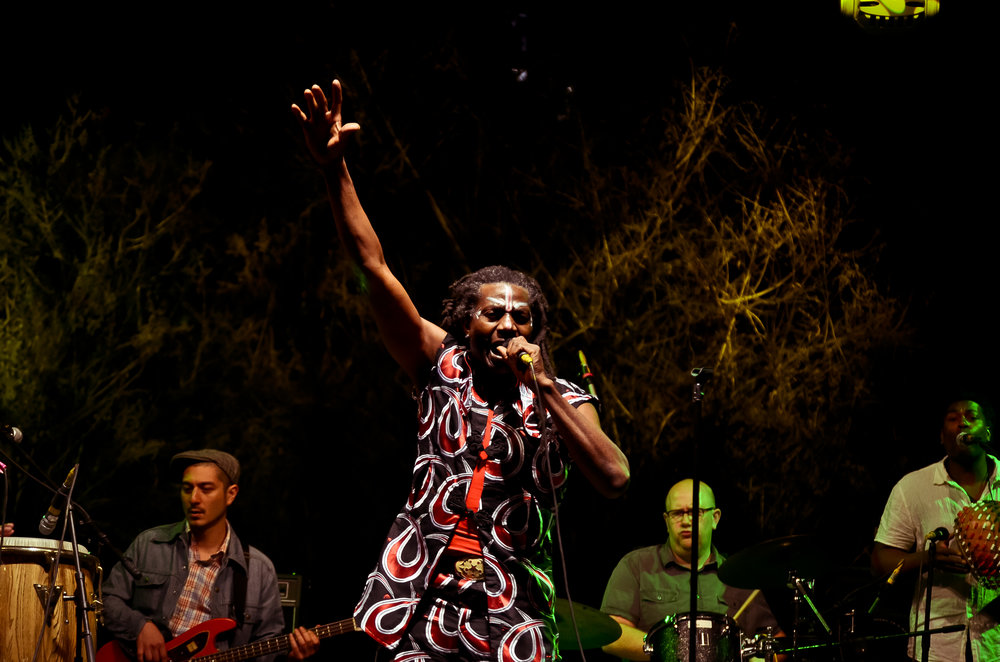Relix 44: Antibalas

Welcome to the Relix 44. To commemorate the past 44 years of our existence, we’ve created a list of people, places and things that inspire us today, appearing in our September 2018 issue and rolling out on Relix.com throughout this fall. See all the articles posted so far here.
Still Bulletproof: Antibalas
On May 26, 1998, saxophonist Martín Perna put together Conjunto Antibalas for a poetry-night set at St. Nicks Pub in the Harlem.
Two decades later, Antibalas—“bulletproof” in Spanish—have grown into Afrobeat’s defining American voice, both introducing a new generation of festival-goers to Fela Kuti’s politically charged sound and turning the genre on its head with their own, highly improvisational modern approach. Together and individually, the members of the Afrobeat orchestra were part of the Broadway musical Fela! and have augmented the likes of David Byrne, Tony Allen, Phish, Amy Winehouse, Arcade Fire, TV on the Radio, The String Cheese Incident, Deer Tick and the late Sharon Jones. (Early Antibalas member Gabe Roth founded Daptone records). As a unit, Antibalas continue to tour and record, releasing the acclaimed Where the Gods Are in Peace last year. And, singer Amayo remains at the center of the musical storm.
In a celebration of Antibalas’ 20th anniversary, the band’s next album will feature all Amayo compositions. Trumpeter Jordan McLean, who joined the group in 1999, looks back on Antibalas’ loving frontman:
It was 20 years ago that the artist known as Amayo first broke onto the New York music scene. At the time, Abraham “Duke” Amayo was a fashion designer and kung fu instructor, inhabiting a ground floor loft on Grand Avenue on Williamsburg’s South Side. Starting with the band on congas and percussion, every gig with the young group allowed more room for him to contribute vocal performances. Antibalas quickly became known for their faithful covers of Fela Anikulapo Kuti, thanks in part to Amayo’s intimate knowledge of the music, having come of age in Fela’s Kalakuta Republic in Lagos, Nigeria.
Before long, Antibalas added vocal arrangements to some of their hottest original instrumentals, mainly contributed by Martín Perna and Daptone (then Desco) Records boss, Bosco Mann. By their second year, Antibalas had released a handful of acclaimed records, toured the U.K., Europe and the U.S., and Daptone Records had built its first Brooklyn studio in Amayo’s now legendary Afro Spot Temple. It was at this time that he birthed his first band as a leader, Amayo’s Fu-Arkist-Ra, whose name calls on the ancestry of Sun Ra. With “Fu,” where kung fu meets Afrobeat, Amayo emerged as the next-generation composer/ bandleader of Fela’s stylistic creation (also described by Fela as African Classical Music).
Amayo’s first compositions included “MTTT (Mother Tocker Tick Tock),” “Fist of Flowers” (expressing kung fu forms) and “Amenawon.” These songs were first taught to members of Antibalas and performed as Fu Arkest-Ra at such legendary New York venues as Black Betty,
and SOB’s. He soon added a set of Chinese New Year/kung fu-centric songs to his catalog, often performing with full dragon and kung fu practitioners as part of the musical outfit. “Fu” had evolved into a standalone ensemble, featuring acoustic string sections and a myriad of members from the New York Afrobeat community, performing at 92Y and The Knitting Factory among many other venues.
He’s since emerged as one of the great contributors to the worldwide movement of Afrobeat as a vocalist, composer and brilliantly unique (and self-taught) keyboard and vibraphone player. This is not to mention his work on sustainability infrastructure projects in his childhood home of Nigeria, focusing on water, internet and environmentally resistant construction projects. Sifu Amayo (as he is affectionately called by his bandmates and martial arts students) continues to expand his artistic résumé and his heart chakra at the same time. His newest composition, “Queen Mother”is featured on a soon-to-be released EP from Armo, a six-piece group co-founded with other members of Antibalas, including myself.
This article originally appears in the September 2018 issue of Relix. For more features, interviews, album reviews and more, subscribe here.



















